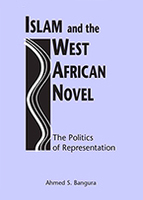
- 2000/176 pages
Islam and the West African Novel:
The Politics of Representation
Extending Edward Said's study of the orientalist tradition in Western scholarship, Bangura traces the origins of contemporary misunderstandings of African Islam to the discourse of colonial literature. Western critics and writers, he observes, typically without access to Islam except through the colonialist tradition, have perpetuated unfounded, politically motivated themes.
Bangura discusses the historical and sociological contexts of Islam in sub-Saharan Africa, providing a framework for the study of West African novels with an Islamic subtext. Contrasting his own reading of the novels of Sembene Ousmane, Aminata Sow Fall, and Ibrahim Tahir with that of traditional Western critics, his analysis also features Wole Soyinka, Deborah Boyd-Buggs, Mohamadou Kane, Ali Mazrui, Cheikh Hamidou Kane, Ahmadou Kourouma, Mbaye Cham, and Kenneth Harrow.







